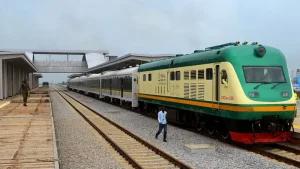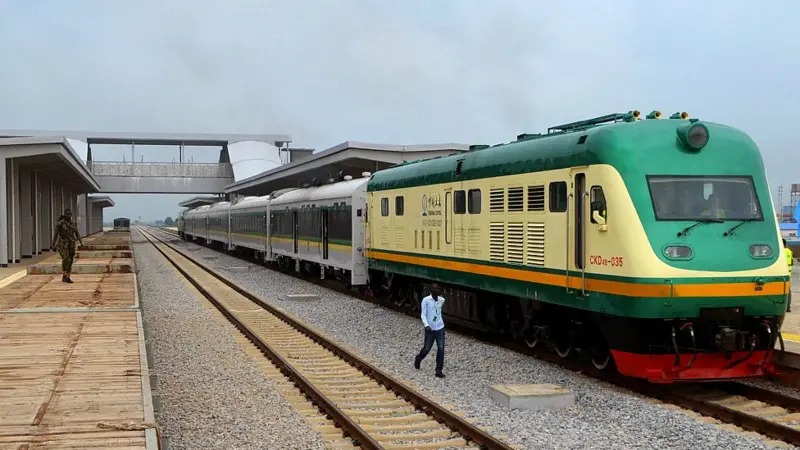
By Adeyemi Adekunle
The Federal Government has earmarked a colossal sum of N44.4 billion in 2025 to expedite the completion of key railway projects, including the Abuja-Kaduna railway line and the Lagos-Ibadan railway, signaling a decisive step in the nation’s infrastructural transformation. This monumental budget underscores Nigeria’s commitment to revamping its transportation infrastructure, a move poised to enhance regional connectivity and catalyze economic growth.
The announcement coincides with the highly anticipated visit of the Foreign Minister of the People’s Republic of China, Wang Yi, who is set to arrive in Abuja on Wednesday for a high-stakes diplomatic mission. As a member of the Political Bureau of the Central Committee of the Communist Party of China, Wang Yi’s visit underscores China’s intent to deepen its partnership with Nigeria, its most significant ally in Africa.
The N44.4bn budget allocation is part of Nigeria’s larger push to modernize its decaying railway network. Once dubbed the backbone of the country’s transportation system, the Nigerian rail network suffered decades of neglect, leading to inefficiency and widespread dependence on road transport. The renewed investment is expected to fast-track the completion of the Abuja-Kaduna and Lagos-Ibadan railway lines, two flagship projects critical to Nigeria’s rail renaissance.
In addition to these high-profile projects, part of the allocation will go toward rehabilitating existing rail lines and developing other critical infrastructure to ensure seamless logistics and passenger movement across the country. “This is not just an investment in transportation; it is a reinvestment in Nigeria’s future and a bold step toward economic diversification,” a government spokesperson stated.
The Abuja-Kaduna railway, initially completed in 2016, has already demonstrated the transformative potential of rail infrastructure. As one of the most utilized routes in Nigeria, it has significantly reduced travel time between the two cities and offered a safer alternative to the Kaduna-Abuja expressway, a notorious hotspot for insecurity. Similarly, the Lagos-Ibadan railway has provided a vital link for cargo and passengers in Nigeria’s economic nerve center, decongesting roads and fostering industrial growth.
Wang Yi’s visit to Abuja could mark a pivotal moment in Nigeria-China relations. As China’s top diplomat and a trusted voice in the Communist Party’s Central Committee, Yi is expected to discuss critical bilateral issues, focusing on infrastructure development, trade, and strategic cooperation.
China has been a key player in financing and constructing Nigeria’s modern railways. Through loans facilitated by the Export-Import Bank of China and executed by state-owned firms such as the China Civil Engineering Construction Corporation (CCECC), Nigeria’s railway revival has largely been powered by Beijing. Analysts suggest that Yi’s visit could set the stage for additional investments in Nigeria’s rail network and related infrastructure.
“China sees Nigeria as a linchpin for its economic interests in Africa,” said Dr. Adebayo Olukoya, an international relations expert at the University of Lagos. “This visit will likely cement further commitments in Nigeria’s Belt and Road Initiative projects and open doors for enhanced technology transfer and capacity building.”
During the visit, Yi is scheduled to meet with Nigeria’s President and key members of the federal cabinet. These discussions are expected to cover a broad range of topics, including economic diversification, regional stability, and debt sustainability—a key concern in Nigeria’s relationship with China.
China remains one of Nigeria’s largest creditors, and while these loans have been vital in financing much-needed projects, questions persist about debt repayment and project profitability. Despite such concerns, Nigerian officials view these loans as investments with long-term benefits.
“Rail infrastructure creates jobs, facilitates trade, and unlocks economic growth,” noted Minister of Transportation Adebayo Ayinde. “Our partnership with China has been instrumental in delivering projects that Nigerians can see and benefit from.”
For China, Nigeria represents an essential trading partner and an entry point into the wider West African market. Bilateral trade between the two countries topped $12 billion in 2023, with Nigeria exporting crude oil and agricultural goods to China while importing machinery and electronics.
While the railway projects symbolize hope, significant hurdles remain. Critics have pointed out that delays, funding challenges, and concerns about local content involvement have slowed progress in some areas. Questions about the sustainability of Nigeria’s debt profile also loom large as the nation continues to borrow to finance its infrastructure ambitions. However, transportation experts argue that the long-term benefits of these railways outweigh the short-term financial risks.
“You cannot underestimate the economic transformation railways bring. From cutting transportation costs to creating an eco-friendly alternative to road travel, these projects will redefine Nigeria’s transportation landscape,” said Professor Musa Alabi of Nasarawa State University.
Yi’s arrival is likely to inject momentum into ongoing projects and further the long-standing relationship between Nigeria and China. With infrastructure development high on the agenda, stakeholders will closely monitor the outcomes of his discussions in Abuja. Nigerians, particularly those in communities awaiting railway links, remain hopeful that these investments will translate into improved standards of living. For farmers in the hinterlands, for example, access to efficient transportation systems could dramatically lower the cost of transporting goods to urban markets, boosting incomes and reducing food waste.
The allocation of N44.4bn for railway development and the arrival of China’s top diplomat come at a critical juncture. For a country grappling with infrastructure deficits and economic challenges, these developments signal hope for a brighter future. With railways often described as the arteries of economic life, their restoration and expansion could propel Nigeria toward unprecedented growth and regional leadership.
The big question remains: can Nigeria sustain the momentum and deliver on its ambitious infrastructure goals? For now, the government and its Chinese partners appear united in their resolve to rewrite Nigeria’s transportation story—one rail line at a time.




